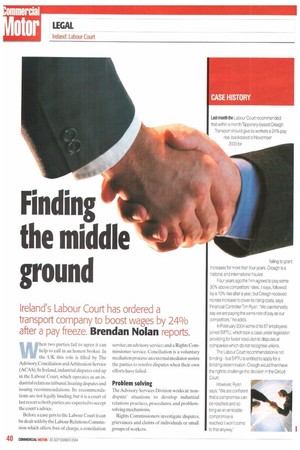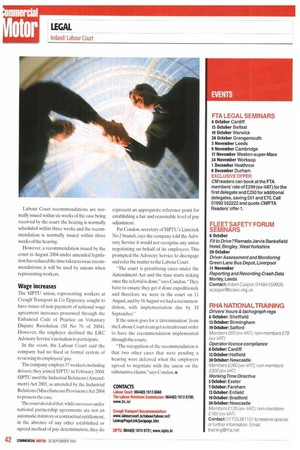Finding the middle ground
Page 42

Page 44

If you've noticed an error in this article please click here to report it so we can fix it.
Ireland's Labour Court has ordered a
transport company to boost wages by 24% after a pay freeze. Brendan Nolan reports.
When two parties fail to agree it can help to call in an honest broker. In the UK this role is filled by The Advisory.Conciliation and Arbitration Service (ACAS). In Ireland, industrial disputes end up in the Labour Court. which operates as an industrial relations tribunal, hearing disputes and issuing recommendations. Its recommendations are not legally binding, but it is a court of last resort so both parties are expected to accept the court's advice.
Before a case gets to the Labour Court it can be dealt with by the Labour Relations Commission which offers, free of charge, a conciliation service; an advisory service; and a Rights Commissioner service. Conciliation is a voluntary mediation process: an external mediator assists the parties to resolve disputes when their own efforts have failed.
Problem solving
The Advisory Services Division works in 'nondispute' situations to develop industrial relations practices, procedures, and problemsolving mechanisms.
Rights Commissioners investigate disputes. grievances and claims of individuals or small groups of workers. Labour Court recommendations are normally issued within six weeks of the case being received by the court: the hearing is normally scheduled within three weeks and the recommendation is normally issued within three weeks of the hearing.
However, a recommendation issued by the court in August 2004 under amended legislation has reduced the time taken to issue recommendations; it will be used by unions when representing workers.
Wage increases
The SIPTU union, representing workers at Creagh Transport in Co Tipperary. sought to have issues of non-payment of national wage agreement increases processed through the Enhanced Code of Practice on Voluntary Dispute Resolution (Si No 76 of 2004). However, the employer declined the LRC Advisory Service's invitation to participate.
In the event, the Labour Court said the company had no fixed or formal system of reviewing its employees' pay.
The company employs 57 workers, including drivers; they joined SIPTU in February 2004. SIPTU used the Industrial Relations (Amendment) Act 2001, as amended by the Industrial Relations (Miscellaneous Provisions) Act 2004 to process the case.
The court decided that, while increases under national partnership agreements are not an automatic statutory or contractual entitlement, in the absence of any other established or agreed method of pay determination, they do represent an appropriate reference point for establishing a fair and reasonable level of pay adjustment.
Pat Condon, secretary of SIFTU's Limerick No 2 branch, says the company told the Advisory Service it would not recognise any union negotiating on behalf of its employees. This prompted the Advisory Service to disengage and refer the matter to the Labour Court.
-The court is prioritising cases under the Amendment Act and the time starts ticking once the referral is done," says Condon:They have to ensure they get it done expeditiously and therefore we were in the court on 11 August, and by 18 August we had a recommendation, with implementation due by 18 September."
If the union goes for a 'determination' from the Labour Court it can get a circuit court order to have the recommendation implemented through the courts.
"The recognition of the recommendation is that two other cases that were pending a hearing were deferred when the employers agreed to negotiate with the union on the substantive claims." says Condon. •


































































































































































































